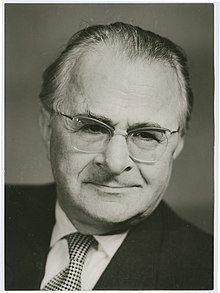Walther Bringolf
Walther Bringolf , also Walter or Hans Walther (born August 1, 1895 in Lörrach ; † March 24, 1981 in Schaffhausen ), was a Swiss politician ( SP ). The former communist is one of the most influential social democrats in Switzerland in the 20th century.
biography
His father worked as a night watchman in a chemical factory in Basel. His mother Verena, née Häusler, came from Baden-Württemberg . The family later moved to Schaffhausen, the father's canton of origin. Walther Bringolf completed an apprenticeship as a bricklayer before briefly visiting the Technikum Winterthur . In 1917 he was a co-founder of the Swiss Soldiers' Association, which defended the dignity and interests of the soldiers against the officers. Under the impressions of the First World War , Bringolf, who would have liked to become an officer, developed into an anti-militarist.
In 1919 Bringolf joined the Social Democratic Party of Switzerland (SP) and quickly rose to become the undisputed spokesman for Schaffhausen's social democracy. In 1921 he fell out with the SP after it had refused to join the Comintern . Bringolf then joined the Schaffhausen section of the new Swiss Communist Party (KPS). In 1922 he took over the editing of the communist Schaffhauser Arbeiter-Zeitung (today Schaffhauser AZ ). From 1924 he was a member of the Schaffhausen city parliament as well as the Grand Council of the Canton of Schaffhausen, and in 1925 he was also elected to the National Council. In the 1930s, his commitment to labor law resulted in the recognition of silicosis (dust lung), a life-threatening condition of workers in foundries and quarries, as an occupational disease.
Walther Bringolf turned 1930 against the Soviet Union possessed social fascism theory and criticized the Stalinism . Stalin then cited Bringolf to Moscow , where he partially gave in. The majority of the Schaffhausen section had meanwhile broken through with the establishment of the Communist Party Opposition (KPO). Bringolf joined her and was expelled from the Communist Party. In 1931 he was re-elected for the KPO in the National Council and in 1933 as city president, an office which he would hold until 1968.
Under the influence of National Socialism , Walther Bringolf again approached social democracy; In 1935 the SP and KPO finally reunited. In September 1940 , together with Karl Barth and others, he founded the democratically oriented National Resistance Action , which was supposed to counter defeatist tendencies against the Nazi-fascist threat to the country.

In 1952 Bringolf took over the presidency of the Social Democratic Party of Switzerland and was one of the first Swiss politicians to know how to use the opportunities offered by the newly emerging television . In 1959 he was nominated as a Federal Councilor when the SP was justifying the magic formula . However, it was unthinkable for the bourgeois majority to elect a former communist to the state government, and they preferred Hans-Peter Tschudi . To some extent, as compensation elected him to the National Council in 1961 for a year to the National President . After that, Bringolf slowly withdrew from politics: in 1962 he resigned the party presidium, in 1968 he resigned after 35 years as Schaffhausen city president, in 1971 he resigned his mandate from the National Council after 46 years. As an aging politician, he showed a visible effort to understand the rebellious youth ( Globus riots ) and moved closer to bourgeois positions. Until his death, Bringolf was Chairman of the Board of Directors of Unionsdruckerei Schaffhausen AG, which relocated the Schaffhauser AZ .
His siblings were the actors Ernst Bringolf (1889–1954) and Elfriede (1888–1977), married to Willy Volker . He was married to Margrit Wildberger.
Works
- Russian trip 1920 . Berlin / Zurich 1920
- Lenin. His life and work. After a lecture held at the Lenin memorial service of the Communist Parties in Schaffhausen and the surrounding area on Thursday, January 31, 1924 . Schaffhausen 1924 ( Internet Archive )
- Perspectives of the socialist movement in Switzerland . Schaffhausen 1940
- Democratic socialism. Fight for the new Switzerland! Zurich 1947
- Social democracy on international problems . Zurich 1948
- The Federal Council without Social Democrats . Zurich 1954
- Socialism in Switzerland . Zurich 1956
- Social democracy and Khrushchev's speech . Zurich 1956
- Problems of international politics . Bern 1961
- My life. Way and detour of a Swiss social democrat . Zurich 1966
- The image of the city of Schaffhausen . Zurich 1967 (together with Walter Ulrich Guyan )
- Talks in South Africa. Impressions and thoughts from an information trip . Zurich 1968
Web links
- Brigitte Studer: Bringolf, Walther. In: Historical Lexicon of Switzerland .
- Schaffhausen City Archives: Walter Bringolf estate
- Publications by and about Walther Bringolf in the Helveticat catalog of the Swiss National Library
- Active service in World War I , radio recording (4 minutes)
- Walther Bringolf and his bicycle dreams , radio recording from 1959 (4 minutes)
Individual evidence
- ^ Walter Wolf: Schaffhauser Biographien VI . Ed .: Arpad St. Andreànzsky et al. No. 81 . Historical Association of the Canton of Schaffhausen, 2007, ISSN 0259-3599 , p. 57-69 .
- ^ J. Tanner: Events are marching quickly. In: A. Suter et al .: Structure and Event , Göttingen 2001
| personal data | |
|---|---|
| SURNAME | Bringolf, Walther |
| ALTERNATIVE NAMES | Bringolf, Walter; Bringolf, Hans Walther |
| BRIEF DESCRIPTION | Swiss politician (SP) |
| DATE OF BIRTH | August 1, 1895 |
| PLACE OF BIRTH | Loerrach |
| DATE OF DEATH | March 24, 1981 |
| Place of death | Schaffhausen |

